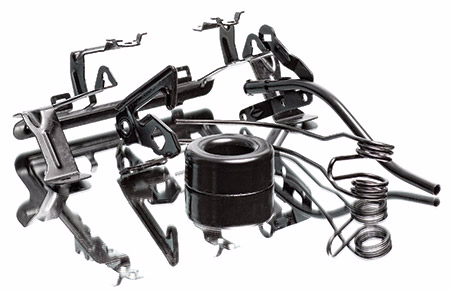
Plastisol coatings are a type of thermoplastic material that is commonly used for protective and decorative purposes across various industries. Composed primarily of polyvinyl chloride (PVC) resins and plasticizers, plastisol coatings offer a durable, flexible, and corrosion-resistant finish that can be applied to a wide range of substrates. These coatings are particularly known for their effectiveness in enhancing the longevity and performance of metals, fabrics, and other materials.
Composition and Application Process
Plastisol coatings consist of finely ground PVC particles suspended in a liquid plasticizer. When heated to a specific temperature, typically between 300°F and 400°F (150°C and 200°C), the mixture gels and then solidifies into a tough, resilient coating. The application process generally involves:
- Surface Preparation – The substrate is cleaned, degreased, and sometimes primed to ensure proper adhesion.
- Dipping or Spraying – The substrate is either dipped into the plastisol or sprayed with a liquid plastisol formulation.
- Heating and Curing – The coated item is subjected to controlled heating, allowing the plastisol to fuse and form a uniform, hardened layer.
- Cooling and Finishing – The coated object is cooled and, if necessary, additional finishing treatments like trimming or texturing are applied.
Benefits of Plastisol Coatings
Plastisol coatings offer several advantages that make them an attractive choice in a variety of applications, from industrial machinery to consumer products. Some of the key benefits include:
1. Durability and Longevity
Plastisol coatings are highly resistant to wear and tear, making them ideal for applications requiring long-lasting protection. They resist abrasion, impact, and harsh environmental conditions, ensuring extended service life for coated materials.
2. Corrosion and Chemical Resistance
One of the most significant benefits of plastisol coatings is their ability to protect metal substrates from corrosion and chemical exposure. This is especially important in industries such as marine, automotive, and industrial manufacturing, where metal components are frequently exposed to moisture, chemicals, and aggressive environments.
3. Flexibility and Elasticity
Unlike some rigid coatings, plastisol remains flexible even after curing, allowing it to accommodate thermal expansion and mechanical stress without cracking or peeling. This flexibility makes it suitable for coating materials that undergo movement or deformation, such as wire racks, tool handles, and automotive components.
4. Insulating Properties
Plastisol coatings provide excellent electrical insulation, making them ideal for use in electrical and electronic applications. Wires, connectors, and metal handles coated with plastisol benefit from enhanced safety by reducing the risk of electrical conduction and short circuits.
5. Comfort and Ergonomics
The soft and cushioned texture of plastisol makes it an excellent choice for enhancing grip and comfort. Many hand tools, sports equipment, and medical devices feature plastisol-coated handles to improve usability and reduce user fatigue.
6. Aesthetic Appeal and Customization
Plastisol coatings come in a wide range of colors, finishes, and textures, allowing manufacturers to customize their products to meet specific aesthetic and branding requirements. Glossy, matte, or textured finishes can be achieved depending on the application method and formulation.
7. Non-Slip and Impact Resistance
Due to its soft, rubber-like properties, plastisol provides a non-slip surface that enhances safety and usability. This makes it particularly useful for playground equipment, safety rails, and flooring applications where slip resistance is a priority.
8. Cost-Effectiveness
Compared to alternative coatings such as powder coatings or specialty paints, plastisol coatings offer a cost-effective solution, particularly for high-volume production. Their ability to be applied in a single step and their durability contribute to overall cost savings.
9. Resistance to UV and Weather Conditions
Plastisol coatings exhibit strong resistance to ultraviolet (UV) rays, rain, and extreme temperatures. This makes them suitable for outdoor applications such as fences, automotive parts, and outdoor furniture, where prolonged exposure to the elements is a concern.
10. Hygienic and Easy to Clean
Plastisol coatings form a seamless, non-porous surface that resists bacterial growth and is easy to clean. This makes them ideal for medical equipment, food processing tools, and laboratory environments where hygiene is essential.
Common Applications of Plastisol Coatings
Plastisol coatings are utilized in a diverse range of industries and applications, including:
- Automotive Industry – Coating for undercarriages, tool grips, and wire insulation.
- Industrial Equipment – Corrosion-resistant coatings for machinery, storage racks, and work surfaces.
- Consumer Products – Handles for pliers, screwdrivers, and exercise equipment.
- Medical Equipment – Coatings for surgical instruments and prosthetics.
- Sports and Recreation – Protective coatings for playground equipment, gym weights, and bicycle handles.
- Marine Industry – Corrosion-resistant coatings for metal parts exposed to saltwater.
Considerations and Limitations
While plastisol coatings provide numerous benefits, they also have some limitations to consider:
Environmental Concerns – Some plastisol formulations contain plasticizers that may raise environmental and health concerns. However, advancements in eco-friendly plastisol formulations are addressing these issues.
Temperature Sensitivity – Plastisol coatings may degrade under extreme temperatures, limiting their use in high-heat environments.
Surface Preparation Requirements – Proper surface preparation is crucial to ensure adhesion, which may increase initial processing time and cost.
Conclusion
Plastisol coatings are a versatile and highly effective solution for enhancing durability, corrosion resistance, and aesthetics in various applications. Their ability to provide flexible, insulating, and impact-resistant surfaces makes them indispensable in industries ranging from automotive to medical and consumer goods. By considering the specific benefits and potential limitations of plastisol coatings, manufacturers can make informed decisions about their use to maximize product longevity, safety, and performance.
Latem Industries Limited has multiple plastisol coating lines to assist you with your requirements. We also manufacture plastisol as well as employing a full time chemist. Do you have special requirements for your plastisol, i.e. UV resistance? Food grade needs? Texture? Allow Latem the chance to quote your specific needs.

